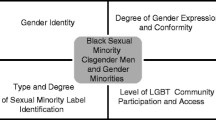Abstract
Gay men, other men who have sex with men and transgender (GMT) populations suffer a disproportionate burden of HIV disease around the globe, which is directly attributable to the virulently homophobic environments in which many GMT people live. In addition to the direct effects of homophobia on GMT individuals, the ongoing marginalization of GMT people has meant that there is limited social capital on which effective HIV prevention and care programs can be built in many low- and middle-income countries (LMIC). Thus, meaningful responses meant to address the dire situation of GMT populations in LMIC settings must include a combination of bold and innovative approaches if efforts to end the epidemic are to have any chance of making a real difference. The HIV Scholars Program at the University of Pittsburgh’s Center for LGBT Health Research is a prime example of a creative and dynamic approach to raising the expertise needed within GMT populations to respond to the global HIV/AIDS pandemic.

Similar content being viewed by others
References
Baral S, Sifakis F, Cleghorn F, Beyrer C. Elevated risk for HIV infection among men who have sex with men in low- and middle-income countries 2000–2006: a systematic review. PLoS Med. 2007;4(12):e339. doi:10.1371/journal.pmed.0040339.
Beyrer C, Sullivan P, Sanchez J, Baral S, Collins C, Wirtz A, Altman D, Trapence G, Mayer K. The increase in global HIV epidemics in MSM. 2013;27(17):2665–78. doi:10.1097/01.aids.0000432449.30239.fe.
Baral S, et al. Engagement of gay men and other men who have sex with men (MSM) in the response to HIV: a critical step in achieving an aids-free generation. AIDS Behav. 2016. doi:10.1007/s10461-016-1388-8.
Baral S, Poteat T, Strömdahl S, Wirtz A, Guadamuz T, Beyrer C. Worldwide burden of HIV in transgender women: a systematic review and meta-analysis. Lancet Infect Dis. 2013;13(3):214–22.
Paiva V, Ayres J, Buchalla C, Hearst N. Building partnerships to respond to HIV/AIDS: non-governmental organizations and universities. AIDS. 2002;16:S76–82.
Mandel JS, Rutherford GW. AIDS prevention research in low and middle-income countries: increasing the dissemination of study results in the scientific literature. AIDS Behav. 2006;10:1–4.
Acknowledgments
This training program could not have succeeded without the keen interest, passion, intelligence, commitment and hard work of the scholars themselves. It should also be said that this program could not have been offered without the careful and generous attention to the scholars’ administrative and housing needs provided by Ms. Celeste Petruzzi of the Department of Behavioral and Community Health Science at the University of Pittsburgh. This program was supported by joint funding and administrative support from the Department of Behavioral and Community Health Sciences of the University of Pittsburgh Graduate School of Public Health and amfAR, The Foundation for AIDS Research. Support from the University of Pittsburgh IRB in reviewing the scholars’ protocols, and parallel reviews conducted by IRB organizations in the scholars’ home countries also deserve recognition. Acknowledgement and grateful recognition also is due to a group of anonymous reviewers organized by amfAR who critiqued the scientific design of the scholars’ research proposals and provided valuable feedback that helped to strengthen their efforts. Support for this paper was provided by amfAR Awards #108471, 108805, 109124 and 109370, “A Training Program for HIV Research among MSM in Developing World Settings”).
Author information
Authors and Affiliations
Corresponding author
Ethics declarations
Conflict of interest
None to report.
Ethical Approval
This article does not contain any studies with human participants performed by any of the authors.
Rights and permissions
About this article
Cite this article
Stall, R., Egan, J.E., Kinsky, S. et al. Overview of the University of Pittsburgh/amfAR Training Program in HIV Prevention Research for MSM and Male-to-Female Transgender Populations in Low- and Middle-Income Countries. AIDS Behav 20 (Suppl 3), 426–436 (2016). https://doi.org/10.1007/s10461-016-1382-1
Published:
Issue Date:
DOI: https://doi.org/10.1007/s10461-016-1382-1




